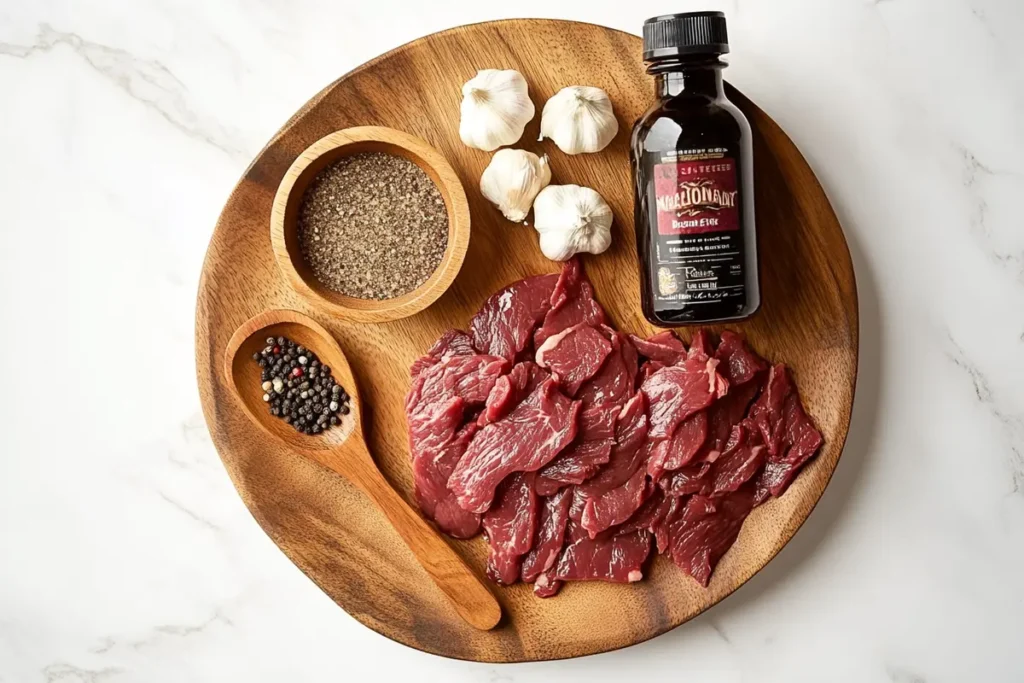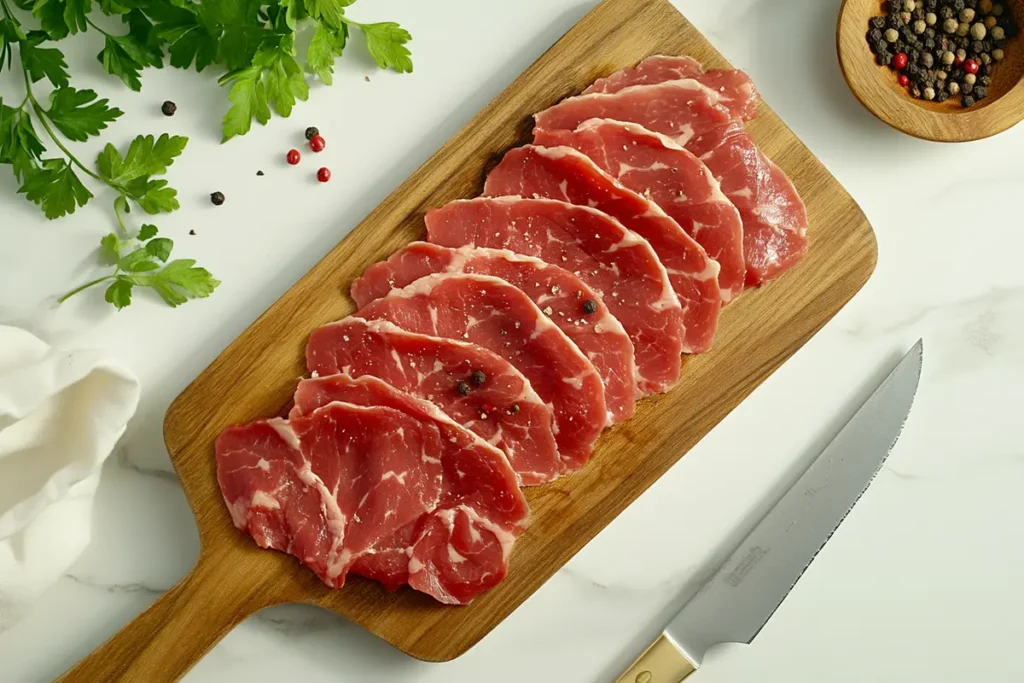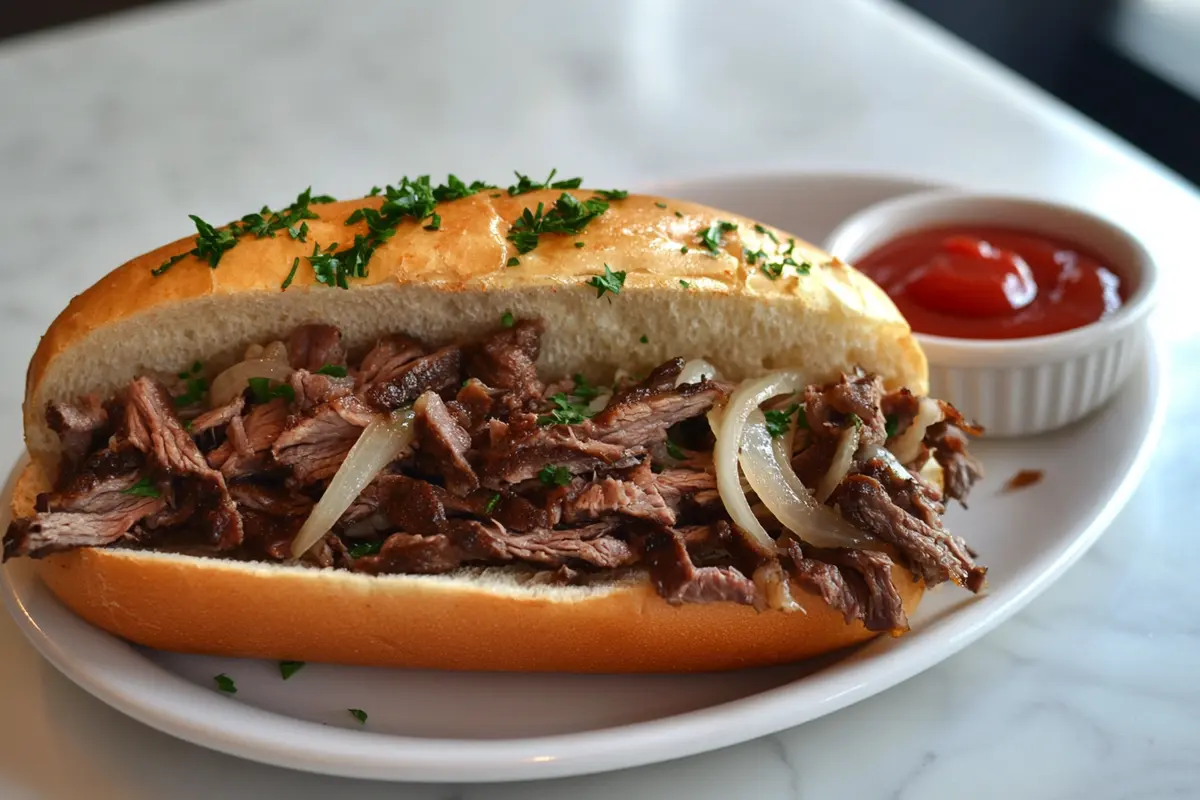Philly cheesesteak is more than just a sandwich; it’s a culinary icon. With its tender slices of beef, melted cheese, and sautéed onions packed into a crusty roll, it’s a beloved classic. But when it comes to preparing the meat, many wonder: Should I marinate my meat for Philly cheesesteak? This article dives deep into the history, science, and techniques behind the ultimate cheesesteak to help you decide if marinating is the right choice for your recipe. We’ll explore the basics of this iconic dish, the purpose of marinades, and expert tips for achieving mouthwatering results.
Let’s start by uncovering the foundation of a great Philly cheesesteak.
Understanding the Basics of Philly Cheesesteak
What is a Philly Cheesesteak?
A Philly cheesesteak is a sandwich that originated in Philadelphia in the 1930s. Traditionally, it features thinly sliced beef, fried onions, and melted cheese, all served in a long hoagie roll. This simple yet satisfying creation has become a staple in American cuisine, loved for its bold flavors and hearty composition.
While authentic versions stick to the essentials, modern variations often include extras like sautéed mushrooms, bell peppers, or jalapeños. But at its heart, a cheesesteak is all about the interplay between the tender beef and gooey cheese.
Key Ingredients in an Authentic Philly Cheesesteak
To create a traditional Philly cheesesteak, you need a few critical components:
- Beef: Ribeye steak is the gold standard for its rich marbling and tenderness.
- Cheese: Common choices include provolone, American cheese, or Cheez Whiz for a classic touch.
- Onions: Sweet white onions sautéed until slightly charred add depth and balance.
- Hoagie Roll: A soft, slightly crusty roll is essential for holding the flavors together.
Traditional vs. Modern Variations of the Sandwich
While purists argue that less is more when it comes to cheesesteaks, creative spins have brought new life to this classic dish. Modern versions might feature chicken instead of beef, spicy sauces, or even avocado. However, these adaptations often stray from the iconic simplicity that defines the original.
In the following sections, we’ll delve into the role of marinades in cooking meat and whether this technique elevates the classic Philly cheesesteak experience. Stay tuned!
The Role of Marinades in Cooking Meat
What Does Marinating Meat Do?
Marinating meat is more than just adding flavor—it’s a science. A good marinade can transform tougher cuts of meat into something juicy and tender. How? By breaking down proteins and infusing the meat with a blend of seasonings. Ingredients like acids (vinegar or lemon juice), oils, and spices all work together to enhance texture and taste. For something like a Philly cheesesteak, where the beef must remain tender yet flavorful, a well-crafted marinade can make a significant difference.
When considering “Should I marinate my meat for Philly cheesesteak?” understanding the science of marination helps you decide. Marinating can keep the beef moist during cooking, ensuring every bite is juicy and packed with flavor.
Types of Marinades to Consider for a Philly Cheesesteak
If you decide to marinate, there are some marinade options to consider. However, keep in mind that these are not traditional. Specifically, choose something that enhances the steak without overpowering the other elements. Therefore, balance is very important.
Simple Herb and Garlic Marinade
A simple marinade with herbs, garlic, and olive oil is a good option. Moreover, these elements won’t overwhelm the natural flavor. Indeed, it can add a delicate, savory flavor. Consequently, it’s a good place to start.
Soy Sauce-Based Marinade
Soy sauce can add umami and depth to the steak. Moreover, this adds a salty and savory flavor. Specifically, a combination of soy sauce, garlic, and ginger can be very good. Indeed, use it sparingly.
Acidic Marinade with Lemon or Vinegar
An acidic marinade with lemon juice or vinegar can tenderize the steak. Moreover, they can also brighten the flavors. However, use sparingly because too much acid can overpower the natural flavor. Therefore, be very careful.
Should You Marinate Meat for Philly Cheesesteak?
Arguments For Marinating Meat for Philly Cheesesteak
Marinating can elevate your Philly cheesesteak game. For starters, marination tenderizes the meat, which is crucial for the thin slices used in this sandwich. A marinade that includes baking soda or vinegar works wonders by breaking down tough fibers and ensuring every bite is tender. Plus, adding bold seasonings directly into the marinade creates a deeper, more consistent flavor profile.
Consider this: Restaurants often serve cheesesteaks with meat that’s incredibly soft and flavorful. One reason? They marinate their beef. So, if you’ve ever wondered, “Should I marinate my meat for Philly cheesesteak?”, marination could be your secret weapon for replicating that melt-in-your-mouth texture at home.
Arguments Against Marinating Meat for Philly Cheesesteak
On the flip side, traditionalists might argue that marinating isn’t necessary. With the right cut of meat, like ribeye or sirloin, natural tenderness can shine through without extra steps. Over-marinating can also ruin the beef’s integrity, making it overly soft or masking its natural flavor.
Some cooks prefer a simple seasoning of salt and pepper, relying on the meat’s quality to carry the dish. This approach preserves the sandwich’s authenticity, as many classic Philly cheesesteak recipes skip marinades altogether.
Key Considerations: Cut of Meat and Desired Flavor – Marinating Meat for Philly Cheesesteak
Ultimately, the decision comes down to your preferences and the meat you’re using. If you’ve got a highly marbled ribeye, marinating may not be necessary. But for leaner cuts, marination can add the moisture and tenderness needed to recreate that iconic cheesesteak texture.
So, “Should I marinate my meat for Philly cheesesteak?” If you’re looking for bold flavors and melt-in-your-mouth results, a marinade might be the way to go. However, sticking to the basics can also yield fantastic results if done right.
Marinating Techniques for a Philly Cheesesteak
If you choose to marinate, here are some techniques to consider. Specifically, these will ensure the best results. Therefore, this section will guide you in the process. Indeed, follow these steps for success.
Proper Storage
Always marinate your steak in the refrigerator. Moreover, this will ensure the meat stays safe from bacteria. Specifically, it also ensures a more controlled environment. Consequently, it’s the best way to prevent food poisoning.
Common Misconceptions About Marinades
People often think marinating longer always equals better results. However, too much marination can leave meat mushy, especially with acidic marinades. Additionally, not all marinades penetrate deeply; many only flavor the surface. This is why thinly sliced beef for cheesesteaks benefits more from marinating than thicker cuts.
So, when asking “Should I marinate my meat for Philly cheesesteak?”, the answer depends on your goals—enhancing flavor, achieving tenderness, or both.
Best Practices for Marinating Meat for Philly Cheesesteak

Choosing the Right Marinade for Philly Cheesesteak Meat
If you’ve decided to marinate, picking the right blend of ingredients is crucial. For a Philly cheesesteak, a marinade should complement the beef’s natural flavors without overpowering them. A popular choice includes a mix of baking soda, vinegar, garlic salt, and Worcestershire sauce. The baking soda works as a tenderizer, while vinegar adds a subtle tang. Spices like onion powder and black pepper round out the flavor, making each bite more delicious.
Avoid using overly acidic marinades for more than 20 minutes, as they can break down the thin slices of beef too much, resulting in a mushy texture. A balanced marinade enhances the meat, ensuring it remains tender yet firm enough to hold its shape during cooking.
How Long Should You Marinate?
When asking “Should I marinate my meat for Philly cheesesteak?”, timing is just as important as the ingredients. For thinly sliced beef, marinating for 15–20 minutes is often enough to tenderize the meat and infuse it with flavor. Longer marination might be tempting, but it’s unnecessary for such small slices.
If you’re in a rush, even a quick 10-minute soak in a baking soda solution can yield excellent results. On the other hand, avoid marinating overnight unless you’re using a mild oil-based mixture. Overdoing it can lead to a loss of the meat’s natural integrity and taste.
For more delicious recipes, check out our Philly Cheesesteak Secret article for tips on perfecting your sandwich.
Expert Tips for Preparing the Perfect Philly Cheesesteak

How to Achieve the Ideal Meat Texture
The key to a memorable Philly cheesesteak lies in the meat’s texture. Thinly slicing the beef is critical, as it ensures even cooking and a tender bite. To make slicing easier, slightly freeze the meat beforehand. This trick keeps the beef firm and prevents it from sliding under your knife.
If you’ve chosen to marinate, be sure to pat the meat dry after draining it. Excess liquid can cause the beef to steam instead of sear, robbing it of that signature caramelized flavor. Remember, “Should I marinate my meat for Philly cheesesteak?” isn’t just about tenderizing—it’s also about how you handle the meat after marination.
Combining Ingredients for Maximum Flavor – marinate meat for cheesesteak
Layering flavors is another way to enhance your cheesesteak. Season the beef generously before cooking, even if it’s been marinated. Adding salt, pepper, and a pinch of garlic powder during cooking complements the marinade’s flavors without overpowering them.
Sautéed onions are a must-have topping, but timing is crucial. Cook them just long enough to soften and caramelize slightly, which brings out their sweetness. Once the onions and beef are cooked, pile them into a freshly toasted roll with gooey, melted cheese. Provolone, American cheese, or even Cheese Whiz work perfectly here.
Don’t Overcrowd the Pan
Make sure you don’t overcrowd the pan. Moreover, overcrowding can lower the heat. Consequently, the steak will not sear properly. Therefore, cook in batches.
Observe Cooking Time
Keep an eye on the steak while it cooks. Furthermore, avoid overcooking it. Specifically, it’s best to cook it quickly. Indeed, you want the steak to stay tender and juicy.
Enjoying Your Philly Cheesesteak
No matter how you prepare it, the Philly cheesesteak is a culinary experience. Moreover, enjoy every aspect of the process. Specifically, from the preparation to the first bite. Indeed, it is a great way to bond over food.
FAQs About Marinating Meat for Philly Cheesesteak
Is Marinating Necessary for All Cuts of Meat?
Not all cuts require marination. Tender cuts like ribeye often don’t need it, as they’re naturally juicy and flavorful. However, leaner cuts like sirloin or bottom round can benefit significantly from marination, adding both tenderness and moisture.
What Happens If I Skip Marinating?
Skipping the marinade won’t ruin your cheesesteak. You can still achieve delicious results by cooking the meat properly and seasoning it generously with salt and pepper. However, marinating adds an extra layer of flavor and ensures the beef remains juicy, especially for home-cooked versions.
Can I Use Store-Bought Marinades?
Yes, but be cautious. Many store-bought marinades are designed for longer marination times and thicker cuts of meat. Look for marinades labeled as “quick” or create your own with pantry staples like soy sauce, garlic, and Worcestershire sauce.
What Are the Best Cooking Methods After Marinating?
For the best Philly cheesesteak, cook marinated meat on a flat griddle or cast-iron pan over high heat. This ensures even cooking, locks in juices, and creates a flavorful crust. Always drain the meat from the marinade before cooking to prevent steaming instead of searing.
For more cheesesteak-related tips, check out our guide on How to Shave Chicken Breast for Cheesesteak.
Ultimately, whether you marinate your steak for a Philly cheesesteak is a matter of personal preference. While it’s not traditional, marinating can add flavor and tenderize the meat. However, the classic version relies on the natural flavors of quality steak, cheese, and onions. Therefore, experiment and see what you like best. Indeed, both ways can produce a delicious sandwich.

